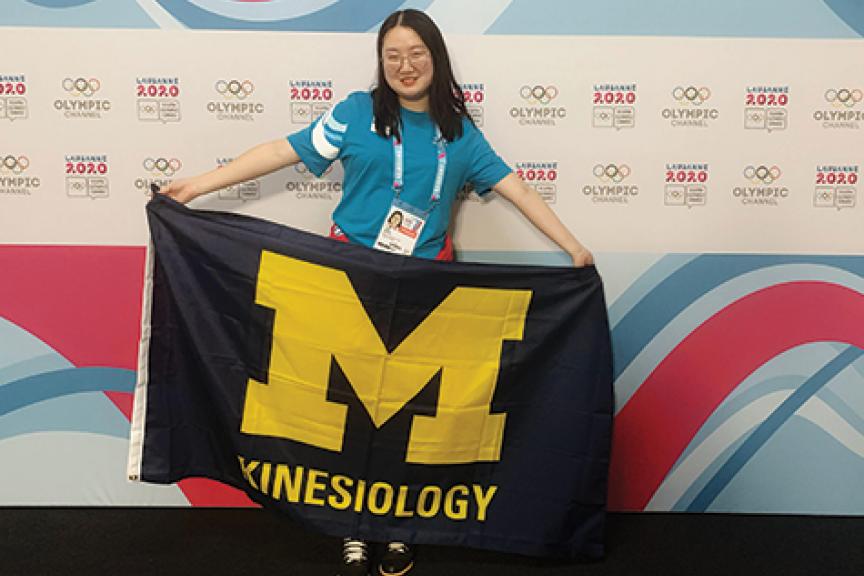
 Back to Profiles
Back to Profiles
Yajie Wang

Sport Management master’s student Yajie Wang is making the most of her Olympic volunteering moments.
Two years ago during the Winter Olympics in Pyeongchang, South Korea, she wrote for the Chinese team’s website and social media as a member of the digital communications team. This January, Yajie found herself volunteering at the main media relations center during the Winter Youth Olympic Games in Lausanne, Switzerland.
She was the journalists’ and photographers’ first point of contact at the media center. Her main duties included answering questions, assessing event credentials, and distributing media tool kits. She also assisted with the daily preparation of the center.
Additionally, Yajie organized photographer placement at the medal plaza media operations site.
While her first internship in Pyeongchang focused on a journalistic approach to covering the games, she wanted additional perspectives to increase her sport industry knowledge.
“If I can know more, besides the communication and media part, about how sports organizations run and about marketing and digital marketing, I can combine what I learned in undergrad and then apply it to the sport industry,” Yajie said.
She added that her U-M degree is helping her learn and step into new roles within the sport industry that are not related to journalism.
“It’s a good program for people from different backgrounds. There is no need for you to have some advanced abilities in the field,” Yajie said. “You connect with clients in the real world, which I think is the most valuable part of the program.”
The Youth Olympic Games takes place every four years, similar to the Summer and Winter Games. However, this is where the similarities end. While the Summer and Winter Olympics revolve around sport, competition, and money-making for the International Olympic Committee, the Youth Olympics serve as a young athlete's debut stage.
Athletes competing at the Youth Games must be 15 to 18 years old by December 31 of the competition year. They also compete on mixed-gender and mixed-national teams in addition to individual competitions.
A culture and education program is featured at every game, with classes on topics ranging from health and fitness to the environment and career planning.
The event brought 1,872 athletes from 79 countries together to compete in 81 different events.
It’s a good program for people from different backgrounds. There is no need for you to have some advanced abilities in the field. You connect with clients in the real world, which I think is the most valuable part of the program.
In addition to free event tickets, Yajie said there were ample opportunities for community members to get involved with the festivities. Students received free tours of the Olympic Museum and community members were able to try different Olympic sports, such as curling and hockey.
Her favorite experience was working with team members from Russia, Ukraine, England, and Ireland in a multicultural environment. She added two-thirds of her team members spoke French, so she learned “bonjour,” “merci,” and “Je parle Anglais,” which translates to “I speak English.”
“It’s really important there because everyone speaks French,” Yajie said. “Because you wear that uniform and have that card on the street, they just speak French to you.”
She heard about the Winter Youth Olympic Games through friends she made from her last volunteering experience in Pyeongchang. However, she almost didn’t go due to financial issues with accommodations. She credits Sport Management professors Dr. Kathy Babiak, Dr. Dae Hee Kwak, Dr. Wenche Wang, and Dr. Ketra Armstrong for encouraging her to go and connecting her to campus resources.
“Dr. Armstong said this is an excellent opportunity, so even if you have to pay by yourself, you must go,” Yajie recalled.
“All the professors are willing to help you, I just love them a lot,” she continued. “I asked every professor I had that semester and they just said, “Yes, if you could get some help from this office, then maybe you can go because you have to grab this opportunity.”
Yajie would recommend this opportunity to other students.
“It’s time to see the world. To jump out of your comfort zone and see how different people cooperate to contribute to this amazing opportunity and make our events international,” she said.